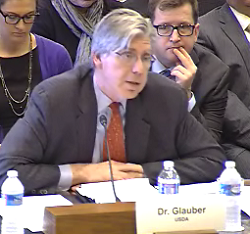 The food versus fuel debate arose once again in front of Congress. At last week’s U.S. House Ag Subcommittee hearing in Washington, D.C., opponents and proponents of the Renewable Fuels Standard presented their arguments on the RFS and its impact on the livestock industry.
The food versus fuel debate arose once again in front of Congress. At last week’s U.S. House Ag Subcommittee hearing in Washington, D.C., opponents and proponents of the Renewable Fuels Standard presented their arguments on the RFS and its impact on the livestock industry.
One of the biggest opponents of the RFS is the poultry industry. Their members argued that ethanol has forced up feed prices that keeps them from expanding operations and fulfilling consumers’ needs to have a cheaper alternative to beef and pork, calling the RFS “broken beyond repair.” But the chief economist at the U.S. Department of Agriculture, Dr. Joseph Glauber, said while ethanol initially did have an impact much bigger factors forced up the price of feed.
“Certainly, the ramp up [in ethanol production] we saw from 2005 to 2010 had a big impact on corn prices, but we also saw a big increase in energy prices, so it’s not the only thing going on,” he told the committee.
In fact, during that same ramp-up period, petroleum prices shot up to record levels, and RFS proponent, Roger Johnson, President of the National Farmers Union, said the agriculture industry should be united for renewable fuels.
“The World Bank found that crude oil is the number one determinant of global food prices. We should reduce our dependance on oil consumption in order to be more food secure, and biofuel production is an excellent way to do that,” adding that pitting the biofuels industry against the livestock growers is counter-productive.
The bottom line, according to Glauber, is that biofuels are important, and they’re here to stay.
“Corn-based ethanol is a vibrant industry and is competitively priced against gasoline, and producers will continue to produce ethanol from corn as long as profit margins are there. And profit margins have been there.”

